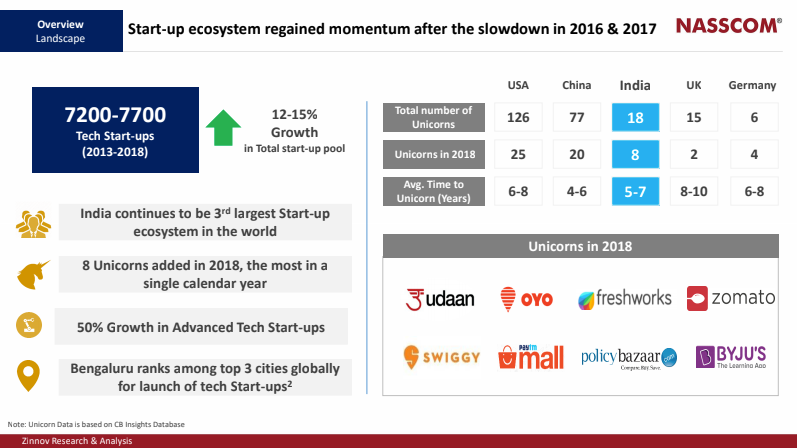After a brief slowdown witnessed in 2016–17, India’s start-up ecosystem is now witnessing an influx of investors. Post 2017, investment into start-ups have increased by over 100 percent, from USD 2.0 Bn in 2017 to USD 4.2 Bn in 2018.
The total number of start-up funding deals especially in the late stages (Series C, D, E, F) witnessed a massive growth of around 250%, from $847 million in 2017 to $3.0 billion in 2018. Even though the amount of seed stage funding raised stood at $151 million, the larger number of late-stage deals rose sharply, signalling a renewed investor confidence in the Indian start-up ecosystem.

These trends were discussed at the launch of the NASSCOM- report on the ‘Indian Start-up Ecosystem — Approaching Escape Velocity’, released on the side-lines of the of the 15th Anniversary Edition of NASSCOM Product Conclave 2018.
Indian unicorns in the B2C space continue to garner global funds and are expanding their horizons to other markets stirring up the competitive landscape. Creating a benchmark in the global start-up ecosystem, the year 2018 witnessed addition of 8 Unicorns, the most in a single calendar year. With the vision of build in India, built for the world, India saw more than 400 cross border start-ups in 2018. The disruptive innovation in technology and process is creating newer Indian start-ups and foreign investors are showing immense interest in these start-ups. This has also led to create more than 40,000 new direct Jobs and 4–5 lakhs Indirect Jobs, taking the total Direct Job base to 1.6–1.7 lakhs.
Growing at 50% year on year, advanced tech start-ups focused on creating solutions in segments like Artificial Intelligence, Analytics, Augmented Reality/Virtual reality, Blockchain and Internet of Things, among others, have witnessed a momentous rise in 2018, driven by factors such as increase in internet penetration, better infrastructure for digital transactions, Govt. push on financial inclusion and innovative tech accelerating the pace of payments, lending & digital banking. Implementation of artificial intelligence is also becoming a norm, growing at 5-year CAGR of 54–58%, witnessing over 120% growth in funding for AI Start-ups (Over USD 150 Mn invested in 2018). Further, blockchain start-ups have observed significant inflow of funding (2 -11 million USD), growing over 500 percent year on year.
“The start-up landscape in the country is becoming the epitome of innovation, with companies bringing out solutions that are aimed at solving locally relevant issues. Today, India is brimming with new ideas which need the right guidance and funding to be scalable for the market. India is advancing steadily towards its digital transformation. The start-up ecosystem is playing a critical role here, bringing in innovation and disruption in much-needed areas, creating jobs, and offering technological solutions to all kinds of problems, thereby improving the lives of people,” said Debjani Ghosh, President, NASSCOM.
In past two years, a number of countries — Israel, Republic of South Korea, Netherlands, Canada, Japan, England, France, Australia, Estonia, Germany and Russia — have collaborated with India at various levels to strengthen the start-ups’ business across the territories. India has led more than 14 International Start-up Exchange Missions. Driven by the need to enhance tech capabilities, expand portfolio, global start-ups are entering Indian terrain, offering a collaborative ecosystem for Indian start-ups to nurture and grow their products, solving unique challenges not only for the deeper Indian markets but also for the world. While, start-ups have the potential to disrupt service delivery system of government and public sector; Government needs to open itself up as a market for start-ups and bring predictability in policy creation. Improving ease of doing business is another important enabling factor for attracting investments.
Enabling structured institutional support for early stage start-ups to tap into Global markets; Aligning state policies to help create sector hubs — move beyond start-up hub to sector specialists hubs; bring focused support for advanced tech start-ups and create higher focus on capacity building than capability building — bringing out training programs and create mentors for start-ups, are some of the areas the industry needs to ponder upon in order to attain higher acceleration for India’s accelerating start-up ecosystem. NASSCOM will continue its drive towards catalysing emerging tech start-ups, build category leaders and support start-ups to create not only for India but also scale up and solve for the world.
About the Author
This submitted article was written by Arjun G of REDACT.





























